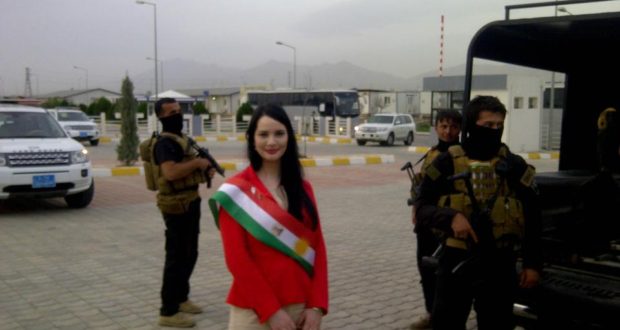September 25, 2017
By Julie Lenarz – Executive Director
In the aftermath of terror attacks, a question that always sparks controversy is in which context Islamic extremism flourishes.
But what if there were a Muslim-majority country that is committed to fighting Islamic extremism alongside us. That has taken significant steps towards gender equality. A place where Jews, atheists and homosexuals don’t have to hide in fear for their life. Where being Sunni or Shia doesn’t determine whether someone deserves to live or die.
This country is in the making. It’s called Iraqi Kurdistan. On September 25, the people of the autonomous region will determine their future, when they go to the ballot box to vote for independence from Iraq – a country that has given the Kurds nothing but misery and culminated in the Al Anfal genocide perpetrated by the Saddam regime in the 1980s and 1990s.
The Kurds, the largest ethnic minority without their own state, have earned the right to independence. They have paid for it in blood. And they don’t deserve to be yoked to the perpetual political pathologies of their neighbours.
The Kurds don’t just pay lip service in the fight against terrorism. They confront Islamic extremism on the frontline with ISIL in northern Iraq every, single day. Almost 2,000 Peshmerga troops, the army of the Kurdistan Regional Government (KRG), have lost their lives in the fight against the terrorist group.
But this is not the only reason why we should throw our support behind Kurdish independence. The Kurds stand apart from their fellow Muslim-majority neighbors because of their strong commitment to gender equality. The Peshmerga have all-female units taking back the fight to ISIL, an organization which considers women second class citizens that are to be killed or subjugated. This is not mere symbolism in a region, where women must justify their place in society every step of the way.
When ISIL took large swaths of Iraq in the summer of 2014, Iraqi Kurdistan took in tens of thousands of refugees, many of them from religious minorities that otherwise would have been slaughtered or enslaved. Their commitment to peaceful coexistence between people of different faiths doesn’t stop here. Two years ago, the KRG appointed official representatives for all religious minorities in northern Iraq.
They are no token appointments like the Jewish representative in Iran, whose only purpose it is to talk about tolerance with a straight face while the mullah regime threatens to destroy the only Jewish state at lightning speed. The KRG’s official has travelled to Israel to build bridges and organized the first ever Holocaust memorial service in Iraq. These are genuine gestures of peace.
With a few exceptions, the outlook for LGBT individuals in the Middle East is devastating. They are being persecuted, arrested and often killed. ISIL throws them off buildings. Iran hangs them from cranes. But just a few hundred miles away, in Iraqi Kurdistan, the LGBT flag was raised during Pride Month at the U.S. consulate in Erbil. There were no protests and no violence. In fact, there is a growing tendency among LGBT individuals to seek refuge in Iraqi Kurdistan and flee the tyranny at home.
I am not trying to sell a rose-tainted, romanticized version of Iraqi Kurdistan. There are still massive problems, not least due to locally manifested structures of tribalism. One brutal practice that sadly persists is Female Genital Mutilation (FGM). But unlike many other Muslim-majority countries that either ignore or deny the problem, the KRG has taken concrete steps to tackle the issue. Their High Council of Women Affairs worked hand in hand with the U.N. on a statistic of FGM in the region and high-ranking female Kurdish officials have vowed to eradicate the horrific mutilation.
Shaking off deep-rooted cultural norms and religious traditions is not easy. But the KRG, more than any other region in the Middle East, has shown its commitment to establish itself as a worthy, reliable and peaceful partner in the international community.
When we intervened in Iraq in 2003, part of the plan was to give people a chance to depart from the bloody past. The KRG has accepted that challenge and embarked upon the most promising democracy experiment in the Middle East since the creation of the state of Israel.
Those are the Kurds. Our friends. Our allies in an ocean of chaos and destruction. When they cast their vote in the independence referendum on Monday, we have a chance to support their legitimate aspiration for self-determination. We don’t want to look back a decade from now and wonder how we lost the Kurds.
 Human Security Centre Human Rights and International Security Research
Human Security Centre Human Rights and International Security Research




